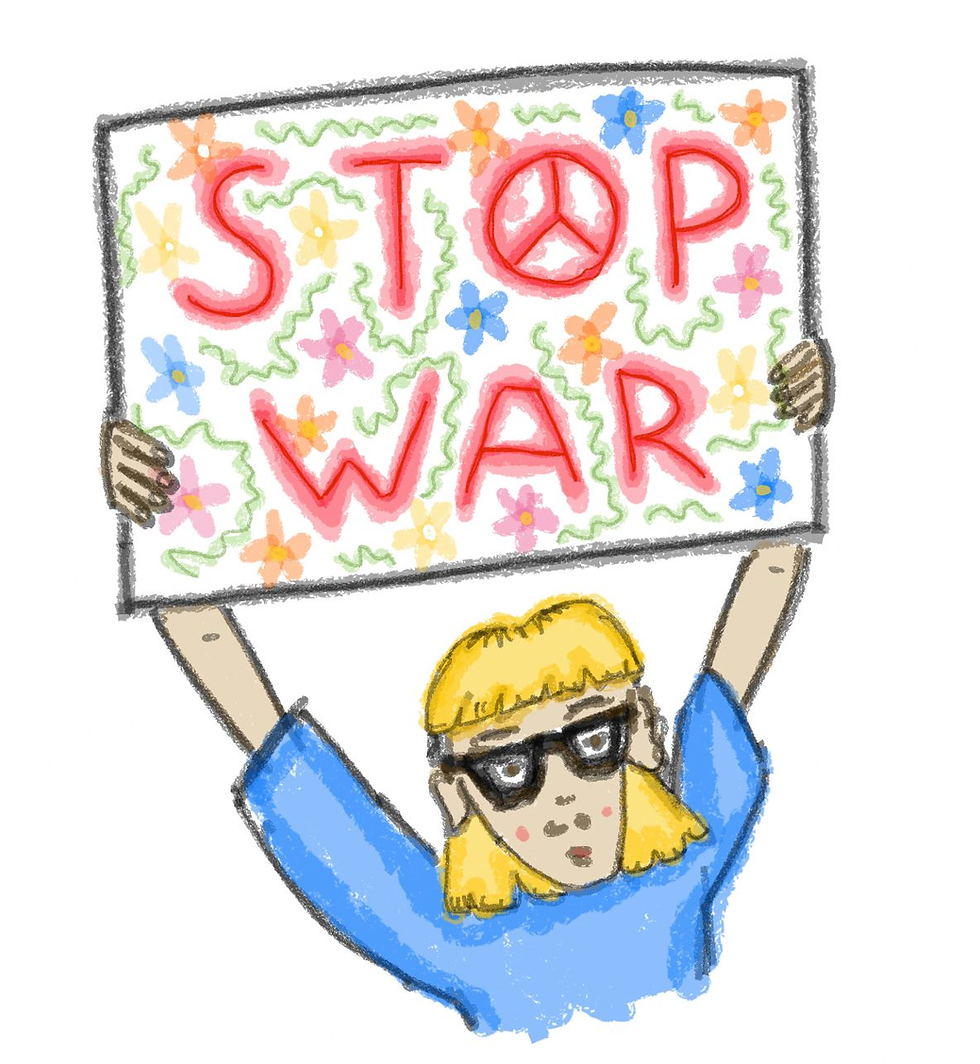Taking gender-based violence seriously
- Sorcha Tipping
- Feb 4, 2022
- 3 min read

Illustrations by Megan Le Brocq
Laura Bates, the manosphere, and how VAWG is a step forward towards reducing gender-based violence.
Violence against women and girls is set to receive the same status as terrorism, with a new government move to add the offence (VAWG) to the strategic policing requirement — meaning that the police must consider it a major priority. This is a key step in the right direction, with the government finally recognising the extent to which gender-based violence is a threat. However, there is still a serious lack of education surrounding the misogynistic treatment of women in today’s world, particularly with the development of technology and the online community.
The ‘manosphere’, defined as “websites and internet discussion groups that are concerned with men's interests and rights as opposed to women's, often connected with opposition to feminism or dislike of women”, is a major threat to the protection of women and girls that many are unaware of. Laura Bates’ book Men Who Hate Women: The Extremism Nobody is Talking About is an extensive analysis of this ‘manosphere’ — exposing the degree to which it is a serious issue that people need to be educated about, and influences the perception of women in mainstream media. The ‘manosphere’ includes all sorts of men’s rights activists, two such being ‘incels’ and ‘pick-up artists’. Pick-up artists (PUAs) are men who use psychological manipulation and coercion in attempts to induce women to have sex with them. They use a mixture of different techniques, such as “negging” – insulting a woman to reduce her self-esteem, and “cave-manning” – aggressively escalating physical contact. There is an entire network of these PUAs, who even go so far as to offer workshops and masterclasses to other men struggling to connect romantically with women. For prices ranging from £700 for a one-day course, to £2400 for a three-day bootcamp, PUAs profit from other men’s loneliness.
In her book, Laura Bates describes pick-up artistry as an “industry that exploits men’s worst fears, preys on their vulnerabilities and literally trains them in harassment, stalking or even sexual assault”. Their advice is “at best, deeply misogynistic, and, at worst, can be described as a manual for sexual violence”. This is a serious problem, targeting and exploiting lonely men who struggle to form romantic relationships. It also defines success with women as the epitome of male achievement, guaranteeing them this success for a price. This industry is dangerous to women, encouraging harassment and even sexual violence, yet is still widely unrecognised as part of the threat to women and girl’s safety.
When these men don’t achieve this romantic ‘success’, the build-up of frustration, loneliness and anger can turn into a hatred of women, ultimately resulting in violence. Incels (“involuntary celibates”) are members of “a group of people who are unable to find sexual partners despite wanting them, and who express hate towards people whom they blame for this”, according to Bates. Incels blame both women and sexually active men for their own unsuccessful romantic relationships — a blame which has potential to harm. In 2014, Elliot Rodger killed six people and injured fourteen others near the Santa Barbara campus of the University of California. Just before the attack, Rodger uploaded a YouTube video explaining his motives for the attack, including his desire to ‘punish’ women for rejecting him, and his envy of sexually active men.
What can we do to deal with this? The answer always begins with awareness — the lack of education and recognition of PUAs as a threat to women is astonishing. The behaviour of PUAs is often excused as ‘cheeky’ or ‘harmless fun’, when in reality it exploits men struggling with low self-esteem, encourages harassment and sexual violence, and teaches them that success with women defines male achievement. When these men don’t achieve this romantic ‘success’, they can turn to the incel community. There they are encouraged to hate others for their failures to form romantic relationships, leading to the kind of terrible violence which took six innocent lives in 2014. Educating the public about this online community can therefore allow men struggling with loneliness and low self-esteem to receive help from valid mental health organisations, rather than others looking to profit financially from their struggles. So, whilst the recognition of VAWG as a priority for the police is promising, we still need to do more. Raising awareness of online communities like incels and PUAs is fundamental to dealing with VAWG, and to making a safer world for women and girls everywhere.







Comments